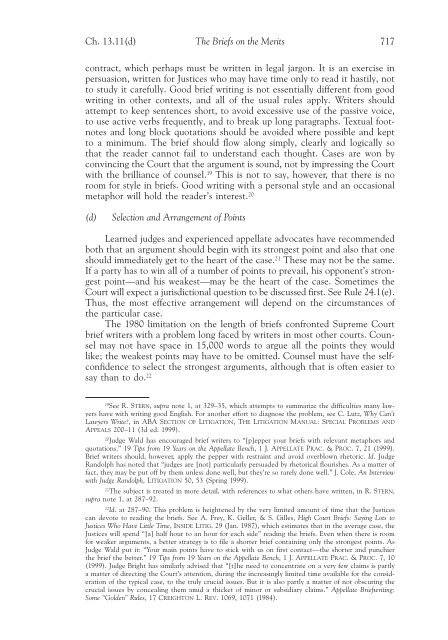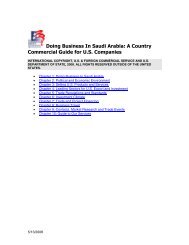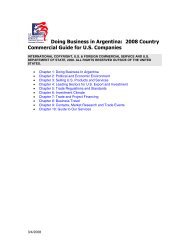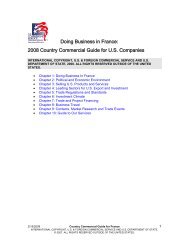Create successful ePaper yourself
Turn your PDF publications into a flip-book with our unique Google optimized e-Paper software.
Ch. 13.11(d) <str<strong>on</strong>g>The</str<strong>on</strong>g> <str<strong>on</strong>g>Briefs</str<strong>on</strong>g> <strong>on</strong> <strong>the</strong> <strong>Merits</strong> 717<br />
c<strong>on</strong>tract, which perhaps must be written in legal jarg<strong>on</strong>. It is an exercise in<br />
persuasi<strong>on</strong>, written for Justices who may have time <strong>on</strong>ly to read it hastily, not<br />
to study it carefully. Good brief writing is not essentially different from good<br />
writing in o<strong>the</strong>r c<strong>on</strong>texts, and all of <strong>the</strong> usual rules apply. Writers should<br />
attempt to keep sentences short, to avoid excessive use of <strong>the</strong> passive voice,<br />
to use active verbs frequently, and to break up l<strong>on</strong>g paragraphs. Textual footnotes<br />
and l<strong>on</strong>g block quotati<strong>on</strong>s should be avoided where possible and kept<br />
to a minimum. <str<strong>on</strong>g>The</str<strong>on</strong>g> brief should flow al<strong>on</strong>g simply, clearly and logically so<br />
that <strong>the</strong> reader cannot fail to understand each thought. Cases are w<strong>on</strong> by<br />
c<strong>on</strong>vincing <strong>the</strong> Court that <strong>the</strong> argument is sound, not by impressing <strong>the</strong> Court<br />
with <strong>the</strong> brilliance of counsel. 19 This is not to say, however, that <strong>the</strong>re is no<br />
room for style in briefs. Good writing with a pers<strong>on</strong>al style and an occasi<strong>on</strong>al<br />
metaphor will hold <strong>the</strong> reader’s interest. 20<br />
(d) Selecti<strong>on</strong> and Arrangement of Points<br />
Learned judges and experienced appellate advocates have recommended<br />
both that an argument should begin with its str<strong>on</strong>gest point and also that <strong>on</strong>e<br />
should immediately get to <strong>the</strong> heart of <strong>the</strong> case. 21 <str<strong>on</strong>g>The</str<strong>on</strong>g>se may not be <strong>the</strong> same.<br />
If a party has to win all of a number of points to prevail, his opp<strong>on</strong>ent’s str<strong>on</strong>gest<br />
point—and his weakest—may be <strong>the</strong> heart of <strong>the</strong> case. Sometimes <strong>the</strong><br />
Court will expect a jurisdicti<strong>on</strong>al questi<strong>on</strong> to be discussed first. See Rule 24.1(e).<br />
Thus, <strong>the</strong> most effective arrangement will depend <strong>on</strong> <strong>the</strong> circumstances of<br />
<strong>the</strong> particular case.<br />
<str<strong>on</strong>g>The</str<strong>on</strong>g> 1980 limitati<strong>on</strong> <strong>on</strong> <strong>the</strong> length of briefs c<strong>on</strong>fr<strong>on</strong>ted Supreme Court<br />
brief writers with a problem l<strong>on</strong>g faced by writers in most o<strong>the</strong>r courts. Counsel<br />
may not have space in 15,000 words to argue all <strong>the</strong> points <strong>the</strong>y would<br />
like; <strong>the</strong> weakest points may have to be omitted. Counsel must have <strong>the</strong> selfc<strong>on</strong>fidence<br />
to select <strong>the</strong> str<strong>on</strong>gest arguments, although that is often easier to<br />
say than to do. 22<br />
19 See R. STERN, supra note 1, at 329–35, which attempts to summarize <strong>the</strong> difficulties many lawyers<br />
have with writing good English. For ano<strong>the</strong>r effort to diagnose <strong>the</strong> problem, see C. Lutz, Why Can’t<br />
Lawyers Write?, in ABA SECTION OF LITIGATION, THE LITIGATION MANUAL: SPECIAL PROBLEMS AND<br />
APPEALS 200–11 (3d ed. 1999).<br />
20 Judge Wald has encouraged brief writers to “[p]epper your briefs with relevant metaphors and<br />
quotati<strong>on</strong>s.” 19 Tips from 19 Years <strong>on</strong> <strong>the</strong> Appellate Bench, 1 J. APPELLATE PRAC. & PROC. 7, 21 (1999).<br />
Brief writers should, however, apply <strong>the</strong> pepper with restraint and avoid overblown rhetoric. Id. Judge<br />
Randolph has noted that “judges are [not] particularly persuaded by rhetorical flourishes. As a matter of<br />
fact, <strong>the</strong>y may be put off by <strong>the</strong>m unless d<strong>on</strong>e well, but <strong>the</strong>y’re so rarely d<strong>on</strong>e well.” J. Cole, An Interview<br />
with Judge Randolph, LITIGATION 50, 53 (Spring 1999).<br />
21 <str<strong>on</strong>g>The</str<strong>on</strong>g> subject is treated in more detail, with references to what o<strong>the</strong>rs have written, in R. STERN,<br />
supra note 1, at 287–92.<br />
22 Id. at 287–90. This problem is heightened by <strong>the</strong> very limited amount of time that <strong>the</strong> Justices<br />
can devote to reading <strong>the</strong> briefs. See A. Frey, K. Geller, & S. Gilles, High Court <str<strong>on</strong>g>Briefs</str<strong>on</strong>g>: Saying Lots to<br />
Justices Who Have Little Time, INSIDE LITIG. 29 (Jan. 1987), which estimates that in <strong>the</strong> average case, <strong>the</strong><br />
Justices will spend “[a] half hour to an hour for each side” reading <strong>the</strong> briefs. Even when <strong>the</strong>re is room<br />
for weaker arguments, a better strategy is to file a shorter brief c<strong>on</strong>taining <strong>on</strong>ly <strong>the</strong> str<strong>on</strong>gest points. As<br />
Judge Wald put it: “Your main points have to stick with us <strong>on</strong> first c<strong>on</strong>tact—<strong>the</strong> shorter and punchier<br />
<strong>the</strong> brief <strong>the</strong> better.” 19 Tips from 19 Years <strong>on</strong> <strong>the</strong> Appellate Bench, 1 J. APPELLATE PRAC. & PROC. 7, 10<br />
(1999). Judge Bright has similarly advised that “[t]he need to c<strong>on</strong>centrate <strong>on</strong> a very few claims is partly<br />
a matter of directing <strong>the</strong> Court’s attenti<strong>on</strong>, during <strong>the</strong> increasingly limited time available for <strong>the</strong> c<strong>on</strong>siderati<strong>on</strong><br />
of <strong>the</strong> typical case, to <strong>the</strong> truly crucial issues. But it is also partly a matter of not obscuring <strong>the</strong><br />
crucial issues by c<strong>on</strong>cealing <strong>the</strong>m amid a thicket of minor or subsidiary claims.” Appellate Briefwriting:<br />
Some “Golden” Rules, 17 CREIGHTON L. REV. 1069, 1071 (1984).












